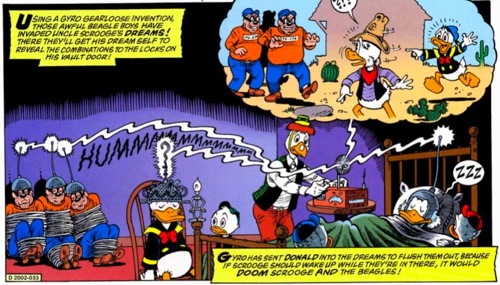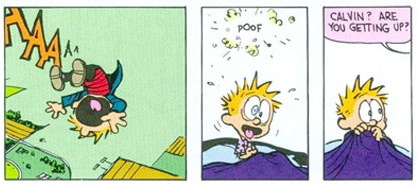So according to I Watch Stuff, Christopher Nolan got the idea for INCEPTION from a Don Rosa story featuring Donald Duck and the Beagle Boys.
But according to Chris Sims, it was Calvin and Hobbes that gave Nolan’s dream epic its inspiration. Which to choose? And apparently, Matthew Vaughn didn’t want X-MEN FIRST CLASS to resemble either Donald Duck or Calvin and Hobbes and had to change 12 pages of plot so Cyclops didn’t suddenly put on a domino mask and start robbing banks.
NOTE: Despite numerous attempts we still haven’t seen INCEPTION, and it still hasn’t been entirely spoiled, but writing these things is hard!!






INCEPTION SPOILER: It was all just a dream.
;)
Or was it?!?
Or maybe it came from Ted White and my 1977 novel, “The Oz Encounter,” where a team of Doc Savage like psychiatrists invade a girl’s dreams in order to affect changes. Or maybe from Little Nemo. The idea has been around as long as dreams and everyone has milked that same cow.
Don’t worry. As with any good narrative, the “what” is less important than the “how” in INCEPTION. The dream stuff is neat, but it’s what they do with it that matters.
I haven’t seen the movie yet either, but reading about it I immediately thought of Mark Wheatley’s mid-1990s series “Radical Dreamer.”
I just want to note that the “what” and “how” of writing are not the same as the “what” and “how” of comics storytelling. In writing, the narrative is the “what”; the plot is the “how.” In a recent discussion about the role of artwork in comics, it was claimed that the artist provided the “how” while the writer focused on the “what,” but the artwork is the “what” and the writer provides the “how.”
SRS
So wordless comics have no “how”? :/
Inception is pretty hard to spoil. Someone would have to describe the entire plot to you in detail.
How complex can the plot be in a wordless comic? Images can be moving, and even move someone to tears, but tearjerkers lose the power to move after several exposures, and knowing beforehand that a story is a tearjerker eliminates the desire to see or read it.
Relying on artwork to carry a story without a plot or character development is akin to relying on special effects to carry a movie.
SRS
Marv, actually, I did think of the first Doc Phoenix story in Weird Heroes vol. 2 when I sat through the movie. I forgot you wrote the great novel-length sequel. Looking back at my tattered copy of vol. 2, White gives a lot of credit for his inspiration to Zelazny’s Dream Master. Kind of interesting that this movie is spawning so many discussions about where ideas come from.
Synsidar, that is a party foul! Have you never read the wordless comics of Jim Woodring or Gilbert Hernandez or Eric Drooker, to name just three?
Synsidar:
“I just want to note that the “what” and “how” of writing are not the same as the “what” and “how” of comics storytelling. In writing, the narrative is the “what”; the plot is the “how.””
Not really. The “what” is what happens, the “how” is everything else. It doesn’t matter whether we’re talking about comics, prose, film, or any other storytelling form.
It’s the specific storytelling decisions that make stories worthwhile. Plots and ideas are cheap – everybody can come up with them. The trick is to try and make people care and discover truths about themselves that they weren’t previously aware of. Plots and ideas can help with that, but they’re never more than means to and end – in a good story, at any rate.
You seem very hung up on plot, but that gets you a good puzzle at best. Good stories require much more than that.
I’m “hung up” on plots because, in comics particularly, plots and character development enable the good writers to display command of technique, craftsmanship, and creativity. Small but important details in a plot make a story more involving than a simple, formula plot that makes the excellence of execution unimportant.
Forster on plots:
An artist can draw a man and woman kissing, and make the scene very affecting, but the scene can mean many different things. The writer provides the context for the scene.
SRS
I really dug Inception. I feel that perhaps it’s one of the best movies I ever seen in my entire life.
If anything, the subject matter is about creativity in itself. I got to thinking about it reminded me of this columnist I used to read in Keyboard magazine who went by the name of Freff on how the mind works in creating concepts and somesuch.
It’s so tuned to my wavelength, I think maybe Christopher Nolan took the dreamscape sequences right out of my Deposit Man books, but in no way do I consider them ripped off after seeing the movie.
~
Coat
Holy shit – the Freff I’m referring to is the very same Connor Freff Cochran who used collaborate with Peter S. Beagle and used to ink pages of Star Trek for DC.
Never realized that they were both one and the same.
~
Coat
Watching INCEPTION, I kept thinking that Nolan wanted to make Neuromancer… just without that techie Computer angle.
“Shared hallucination” of an imagined world: check. Shadowy zaibatsus and industrial espionage: check. A hired-gun deck ‘cowboy’ over his head: check.
Still, a decent movie; another Nolan triumph. (Even though it is the second Leo DiCaprio movie in a row with a ‘twist’.)
it might be inspired by many comic series. some say it was satoshi kon’s anime movie paprika, with the same theme.
it could be all of this stuff, nolan said that he was devoloped the proyect for so many years that it’s possible that a lot of material was used fot it.
nolan itself have to talk about that but the thing is that the movie is great, I like it a lot.